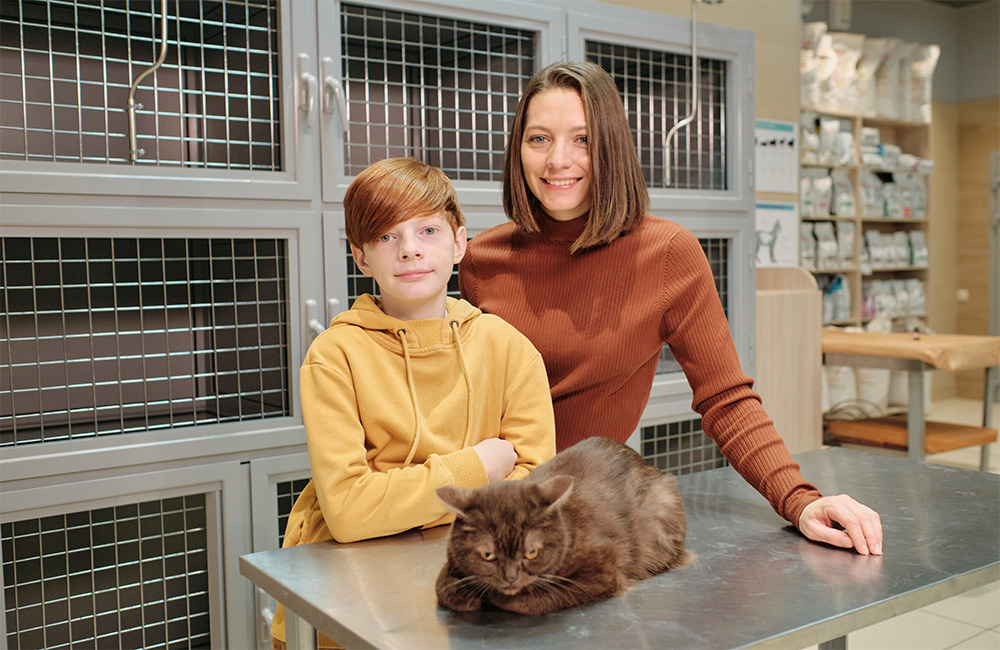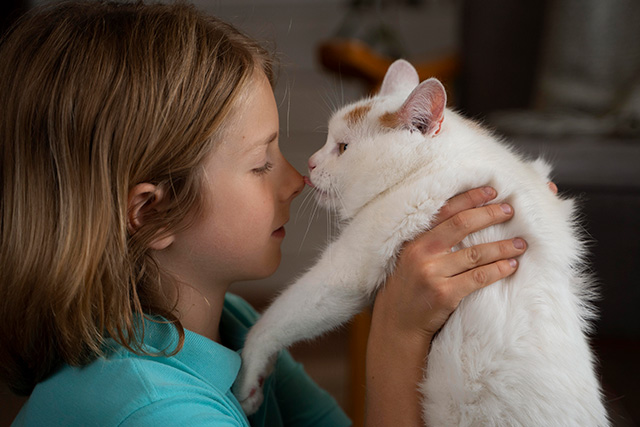Having a pet is both a rewarding and challenging experience. Studies have shown that owning a pet can reduce stress levels and contribute to the psychosocial of both children and adults. In fact, there are numerous cases where people’s lives have been saved by the animals they care for, regardless of the type of pet.
Let’s take a moment to appreciate the wonderful benefits that come with owning a cat!
Cats Reduce Stress and Offer Companionship
The perks of owning a cat outweigh any drawbacks. They make excellent companions for both families and individuals.
Recent studies have highlighted the numerous physical and psychological advantages of having pets in general. Cats can lower blood pressure, reduce cholesterol levels, and even decrease the risk of heart disease-related mortality. Cat owners tend to make fewer visits to the doctor and experience fewer minor health issues.
Moreover, cats can provide emotional support when needed most. They offer a sense of intimacy that can alleviate feelings of loneliness, especially for those battling illnesses. Cats show unconditional love to their owners and family members, never holding grudges or causing emotional harm. It’s no wonder that many people form deep bonds with their cats and struggle with their loss. The memories shared with a beloved feline companion are cherished forever.
It’s been said that cats have a knack for sensing when their owners are unwell. Many individuals have observed that their cats stay close when they’re sick, offering comfort and companionship during tough times. Cats can also pick up on emotional distress in their owners, showing empathy in their own unique way.
Cats Benefit Children
If your child frequently misses school due to illness, getting a cat might be a wise choice. Research indicates that children who own pets attend school more regularly than those without pets, with up to nine extra days of school attendance per year. Pet owners typically have stronger immune systems, making them more resilient to illnesses and reducing doctor visits.
Concerned about allergies and cat hair triggering sensitivities? Surprisingly, cat hair isn’t the culprit. Some asthma researchers suggest that early exposure to pets might help the immune system adapt and become less reactive to allergens later in life. In fact, the absence of pets in a child’s environment could potentially lead to increased asthma sensitivities. Just like doctors recommend exposing children to different germs to boost their immune systems, exposure to pets from a young age could have a similar effect.
Studies have also linked pet ownership to lower blood pressure and decreased anxiety levels. A long-term study revealed that individuals who have never owned a cat face a higher risk of heart attack-related death compared to current or previous cat owners. Interestingly, the protective benefits against heart disease seem to be more pronounced for cat owners than dog owners. Researchers at the State University of New York found that even the mere presence of a cat can lower blood pressure, as evidenced by stockbrokers with hypertension who experienced reduced blood pressure levels even when away from their feline companions.
While the health benefits of cat ownership are quite surprising, they are just the tip of the iceberg when it comes to the advantages for children. Living with a cat can lead to various psychological benefits, such as increased empathy and prosocial behaviors. Children who grow up with pets tend to be more attuned to non-verbal cues and display better understanding of body language. A study involving 455 school children demonstrated that those with pets had a superior ability to interpret non-verbal communications, making them more popular among peers than those without pets at home.
Having pets can significantly impact a child’s life in various positive ways. For instance, children who have pets tend to engage more in sports, hobbies, clubs, and social activities. Surprisingly, studies even suggest that kids who own cats may have a higher IQ than those who don’t.
Moreover, having a pet teaches children responsibility from an early age. Taking care of a pet can make kids feel needed, fostering a sense of responsibility that can extend to other areas of their lives. Cats, for instance, are relatively low-maintenance pets since they groom themselves and don’t require walks like dogs do.
The social skills and sense of responsibility gained from owning pets can lay a solid foundation for a successful future. A study involving 394 university students in the US revealed that those who had pets during childhood, whether dogs or cats, tended to be more self-assured compared to their pet-less peers. This boost in confidence might stem from the higher self-esteem observed in children raised with pets, who benefit from the unconditional love and support their furry companions provide.
Pets often hold a special place in children’s hearts, akin to parents, grandparents, and siblings. Kids frequently confide in and talk to their pets, considering them essential friends. Research spanning five years and involving 600 children aged 3-18 showed that pet-owning kids, particularly those facing challenges like learning difficulties or parental divorce, adapt better to life’s ups and downs. The unwavering love and companionship offered by pets can serve as a comforting buffer during tough times.
The therapeutic value of pets has long been recognized, with animals playing a crucial role in helping sick children relax and diverting their attention from illnesses. Some healthcare providers acknowledge the importance of pets in children’s lives by including pet names in patients’ medical records alongside other family members. Even in the dreariest hospital settings, chatting about a beloved pet can inject a much-needed dose of positivity.
The Pet Store: My Pet Peeve
While pet stores may seem harmless at first glance, they often conceal a dark reality. Many pet stores acquire animals from profit-driven mills that breed animals indiscriminately, prioritizing financial gain over animal welfare. Consequently, pet stores are often pricier compared to other adoption options, focusing predominantly on purebred animals rather than mixed-breed ones. This practice raises ethical concerns and poses significant risks to animal health and well-being.
Pure Breeds Are Not All They Seem
Opting for a purebred cat may seem appealing due to the detailed information available on specific breeds, allowing prospective owners to select felines that match their preferences closely. However, the allure of purebred animals quickly fades when one considers the health issues, reduced lifespan, and negative personality traits associated with inbreeding. Purebred animals are often plagued by congenital defects and diseases passed down through generations, highlighting the drawbacks of prioritizing lineage over genetic diversity.
In contrast to nature’s diverse breeding patterns, human intervention in animal breeding often leads to detrimental consequences. By creating genetically homogenous purebred animals through inbreeding, breeders inadvertently perpetuate inherited health issues and behavioral problems. In the wild, animals mate across compatible species, ensuring a diverse gene pool that strengthens the population. In contrast, human-bred purebred animals lack genetic variability, making them more susceptible to hereditary ailments and complications.
Choosing to invest a substantial sum in a specific breed entails acknowledging the associated health and behavioral risks. However, opting to adopt a mixed-breed cat from a shelter presents a win-win scenario. These “mutts” often exhibit robust health, pleasant temperaments, and resilience, making them excellent companions. Therefore, adopting a shelter cat not only saves a life but also fosters a healthier and more sustainable approach to pet ownership. Next time you visit a pet store, consider inquiring about their sourcing practices to make an informed decision that aligns with ethical and compassionate pet care.
If you would like to donate to The Humane Society of the United States, click the button below. You will be directed off-site in a new window.
Disclaimer: I Love My Kitty Cat is not affiliated with The Humane Society of the United States.


